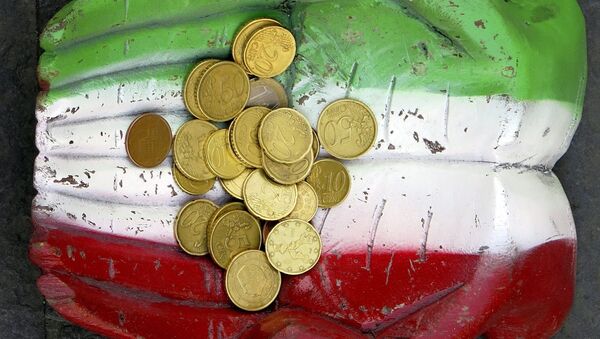Italy, some economists say, is one of the countries most negatively affected by the 20-year euro experiment, with stagnant growth and a youth unemployment rate of 30 percent. Speaking to Sputnik Italia, economist and writer Ilaria Bifarini explained how the euro harms Rome, and offered her thoughts on how long the currency union will last, given its perceived negative impact.
"The euro was a bankrupt project from the very beginning, and plenty of economists have spoken about this, including six Nobel laureates," Bifarini said. "On the whole, the Eurozone's economies have grown much less than that of the non-euro countries. For example, in the period between 2006 and 2015, the economies of the European countries not using the euro grew by 8.1 percent, while those of countries using the currency grew by just 0.6 percent," she noted.
According to Bifarini, by stepping into the currency union, Italy lost not only its monetary sovereignty, but its economic and political sovereignty as well. "When you deprive a country of the opportunity to manage its own currency and exchange rate, it becomes much more difficult to implement economic policies. Furthermore, when it comes to taxes, Italy is limited by the Maastricht criteria, and other constraints imposed by Brussels."
Economists have long said that many of Europe's struggling economies, such as Greece, which recently marked the anniversary of its decade-long economic crisis, could have avoided the misery if they had a national currency to devaluate, as well as the ability to set their own interest rates.
Today, Bifarini complained, "Italy no longer has the ability to resort to the devaluation of its currency, nor the possibility of implementing an independent policy on public spending which could bring the country back to growth."
"I hope that the end of the Eurozone comes as soon as possible, because it is an unsustainable system. Otherwise, all the countries of the Eurozone, with the exception of Germany, will continue suffer limits to growth," the economist said.
Asked whether the Eurosceptic alliance government in Rome, which intensely criticized the euro ahead of elections earlier this year but has since subdued its critiques, would make a move to take Italy out of the Eurozone unilaterally, Bifarini said this was unlikely. Instead, she believes, given the currency's unsustainability, the project is simply destined to implode, even if the public isn't ready for it at this point.
"Leaving the Eurozone along with other countries would make the process much easier, but the public is afraid of abandoning the euro, thinking this is impossible. A lot of energy has been spent creating this myth. We are talking about an experiment of a currency system which, in less than 20 years, has failed, and needs to be reviewed and eventually brought to an end without creating panic among the public. At the moment there is a taboo, albeit an unfounded one, about rejecting the euro," she said.
The views and expressed by Ilaria Bifarini are those of the observer, and do not necessarily reflect those of Sputnik.




